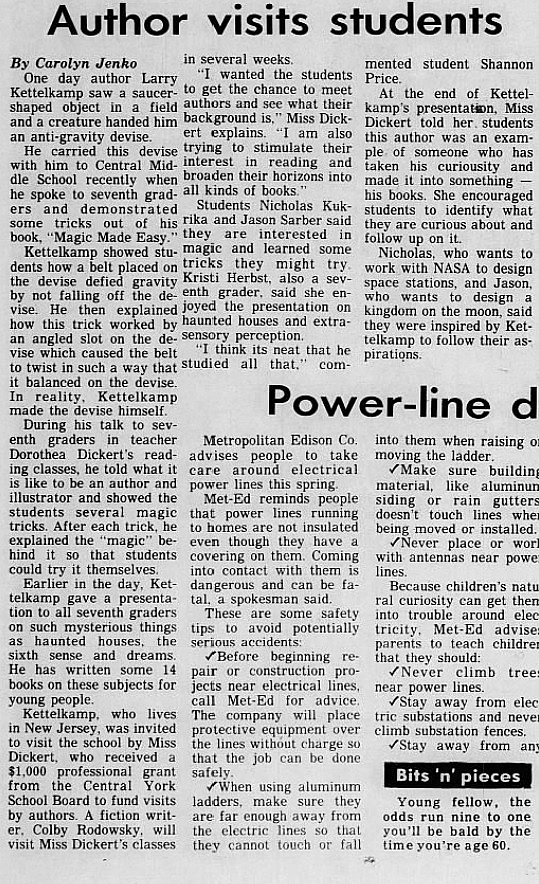- Title: Investigating UFO's
- On a scale of 1 to 10, how unhappy does "UFO's" with an apostrophe make Otto? In 2019, I rated it an "11," but that was just for the error appearing in the text. Its presence in the title of this book is an off-the-scale punctuation abomination.
- Author: Larry Kettelkamp
- About the author: According to the bio included in the book, Kettelkamp was born in Harvey, Illinois; graduated from the University of Illinois with a B.F.A. in painting in 1953; served two years in the Army; eventually moved to Cranberry, New Jersey; and had his lifelong hobby turn into his first published book: Magic Made Easy. Other books by Kettelkamp include Dreams; Drums, Rattles, and Bells; Haunted Houses; Kites; The Magic of Sound; Puzzle Patterns; Shadows; Sixth Sense; and Spooky Magic.
- Cover designer: Unknown
- Publisher: William Morrow and Company, New York
- Year: 1971
- Pages: 96
- Format: Hardcover
- Price: Unknown. Dust jacket is price-clipped
- Dust jacket excerpt: "Are Unidentified Flying Objects real or imaginary? Much investigation has been done on this question, but there still is no clear answer. Feeling that the objective data gathered should be made as widely available as possible, Larry Kettelkamp has written this survey on what government and civilian groups have learned to date."
- Provenance: It was clearly a library book, but the only clue I can find is a lone stamp on the inside back cover for "BINFORD I.M.C." IMC likely stands for Instructional Materials Center.
- Thanks from the author: "The author wishes to thank the following researchers for contributing materials and offering helpful suggestions:"
- Dr. Robert Jahn, Professor of Aerospace Sciences, Princeton University, Princeton, New Jersey
- Mr. Stuart Nixon, Executive Director, National Investigations Committee on Aerial Phenomenon, Inc. (NICAP), Washington, D.C.
- Mr. Richard Greenwell, Assistant Director, Aerial Phenomena Research Organization, Inc. (APRO), Tucson, Arizona
- Dr. J.M. Holman, Manager Mission Analysis, RCA Space Laboratories, Princeton, New Jersey
- First sentences: In 1966 a nationwide Gallup poll questioned Americans about UFO's, or Unidentified Flying Objects. According to the poll, more than five million Americans have seen something they believe was a flying saucer. [For context, the population of the U.S. in 1966 was about 196 million.]
- Last sentences: Many UFO reports indicate that such visitors may have been here already. This exciting possibility is what makes the study of UFO's so important and so fascinating.
- Random excerpt from middle: Unfortunately, photographs of flying saucers can be faked.
- Online review excerpt #1: Kirkus had this to say in 1971: "Overall, it's a concise if somewhat weighted summary of saucer lore, well organized and attractively laid out, by a master of far-out subjects; but the need for still another rehash is debatable."
- Online review excerpt #2: Writing on Pamphlets of Destiny in 2019, Lawrence Burton states: "Investigating UFOs is a children's book, so the language is clear, with the subject simplified to some degree, and thankfully free of the crankier tone which informs most of the writing on this topic — because this was the era of children's books being written with some sense of educational responsibility. It took me about an hour to read it cover to cover, and at no point did I feel ridiculous, and it was very enjoyable; so there you go."
- Full disclosure: I have a couple other UFO-related ephemera items in the ever-full hopper of upcoming posts, so prepare for more saucer shenanigans in 2021.
- Other full disclosure: I have never, to my knowledge, seen a UFO.
But wait, there's more!
We used to have a saying that "all news leads back to York, Pennsylvania." To that end, I found a news clipping about an appearance by Larry Kettelkamp at Central York Middle School in the April 13, 1987, edition of The York Dispatch:
Postscript
Obama tells @ezraklein he “absolutely” would like to know what the UFOs are. But he says if they’re proven to be aliens, “I would hope that the knowledge there were aliens out there would solidify people’s sense that what we have in common is a little more important.”
— Edward-Isaac Dovere (@IsaacDovere) June 1, 2021




https://www.collinsdictionary.com/us/dictionary/english/ufo
ReplyDeleteUFOs or UFO's is acceptable. Four questions for President Obama pertaining to his comment: "would solidify people’s sense that what we have in common is a little more important” 1. What people have that sense, that only needs solidified? 2. What do they think people have in common that is more important? 3. More important than what? 4. Why is whatever "they" think is more important, really more important?